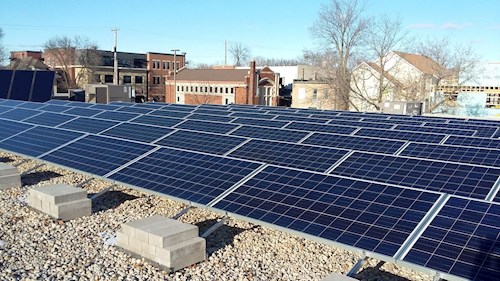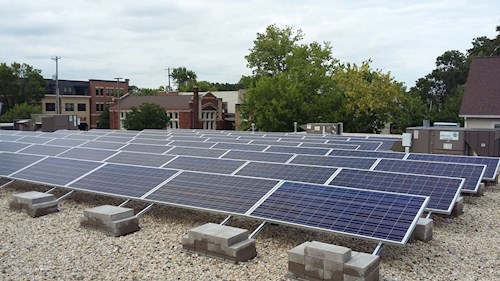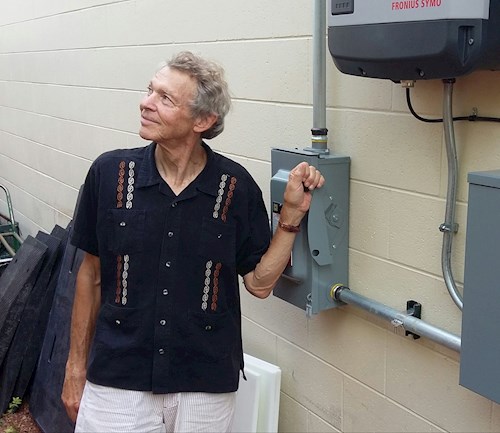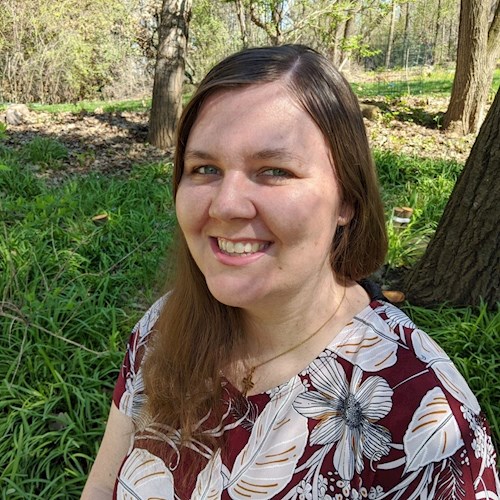

Atop Willy Street Grocery Co-op East are 80 solar panels producing up to 25.6 kW of energy. The story of how they got there is a unique one and serves as a model for over forty other projects around the state, with more to come.
For most businesses, installing solar is a relatively straightforward process: hire a solar contractor, pay them, get the panels installed, and then get a nice tax credit from the federal government. When Willy Street Co-op became interested in solar, however, they ran into a snag: as a co-op, the tax credit they would receive would have to be distributed among all 18,000 owners. That didn’t seem very practical.
Enter Kurt Reinhold. Kurt began as a science teacher and a physical therapist, with no formal training in tax law or business. However, that wasn’t about to stop him from making a difference. Back in 2010 and 2011, he had been working on facilitating peer-to-peer loans among his neighbors, so that those who were interested in supporting solar could help with the capital costs for those neighbors whose houses would actually benefit from it. “Healing the earth one rooftop at a time,” as he described it. However, organizing multiple loans for a single project required a lot of duplicated effort. Surely there was an easier way to do it.
That was the beginning of Legacy Solar Co-op (LSC) and its support of projects like Willy Street Co-op.
The basic premise is that individuals (specifically Wisconsin residents who are members of LSC) buy Slice of Sun Solar Bonds from LSC with a rate of return of around 3%, depending on how many bonds one buys. It’s a simple and straightforward process - I bought some of their bonds earlier this year. The money from these bonds isn’t directly tied to specific projects; instead it goes into a pool which LSC can draw from as needed.
Next, an organization interested in solar talks to LSC. This might be a co-op, like Willy Street, or a non-profit, school district, local government, or other organization that can’t benefit from the solar tax credit.
The final piece of the puzzle is the tax sponsor. This is typically an individual, family, or business that’s associated with either the interested organization or LSC and can pay at least half of the cost of the project themselves. There are exceptions, though; the only critical part is that they pay taxes themselves and can benefit from the credit.
After negotiating all of the details - often one of the more time-consuming parts of the process - LSC uses the money that its members have contributed to make a loan to the tax sponsor for the other half of the project cost. The sponsor takes that money along with the portion they’re contributing and pays for the solar array to be installed, after which they receive the tax benefits.

In Willy St. Co-op’s case, the solar benefits were also supplemented by a switch to LED lighting throughout the store as part of the same project, which ended up producing nearly a quarter of the project’s energy savings while being less than a tenth of the total cost.
Five years after Willy St. Co-op began their solar project in 2016, they bought the solar array from the tax sponsor, who then repaid the remainder of the loan from LSC. With that, the project has finally come full circle, proving that this is a financing model that can benefit all parties involved - Willy Street Co-op, who got their solar array at a significant discount; Don Wichert, the tax sponsor, who received a return on the money he invested in the project; and LSC and its bondholding members, who received a return on their investment along with a little extra for operating costs.

(Don Wichert turning on the solar panels at Willy St. Co-op in 2016. Photo from Don Wichert; used with permission.)
Don said that it was incredibly fun to do the project and see how it turned out and it was great to work with Willy St. He thinks he probably won’t be a tax sponsor again, though - as LSC has been growing, so, too, have their projects and he’s not quite prepared to put up half the cash for a half million dollar project!
That’s not the only way to get involved, though. Don still plans to be an LSC member and bondholder. He describes this model as “democratizing solar energy.” People who can’t put solar on their own roofs - Don himself has far too many trees to make that practical, while I’m a renter - have an opportunity to get involved in supporting solar another way. Kurt says, “Legacy Solar Co-op can help members achieve their highest environmental impact for their renewable energy dollar.”
Kurt also pointed out that another key player is the “internal champion” - someone who is involved with an organization that might benefit from solar. The internal champion needs to be willing to educate and help achieve consensus between the decision makers of the organization and provide the necessary motivation to keep the project going forward. Once there’s interest and dedication from the host site, LSC can provide support and advice, serving as a solar agent and helping projects get proposals from a variety of solar contractors, even before they make any loans.
With the success of the Willy Street project, LSC has gone on to work on dozens of other projects across the state. One they’re working on right now is the Access Community Health Center on E. Washington St. in Madison. They’ve also worked with St. John’s Lutheran Church, the Literacy Network of Dane County, several City of Fitchburg buildings, and many others. When they started, LSC might work on one or two projects a year - now they’re up to a dozen a year and still growing.
LSC isn’t the only organization doing this, either. SolarShare Wisconsin Co-op, created in part by RENEW WI, works on a similar business model but for larger, utility scale projects. They are currently working on their first two projects.
Kurt notes that since the inflation reduction act (IRA) was signed into law last week, a new provision allows municipalities, tribal entities, and 501(c)(3) organizations to receive a “direct payment“ equal to 30% of the cost of the system in lieu of a tax credit. This will help organizations who can make up the rest of the cost of the project move forward; but, he says, most organizations will still benefit from tax sponsor financing offered through Legacy Solar Wisconsin Cooperative.
The Wisconsin Public Service Commission (PSC) is also expected to make a final ruling on the issue of third-party financing later this year. That could open up the state to additional financing methods, such as solar leases, which are common in other parts of the country.
“We have to make changes,” Kurt told me. “We can’t just put our heads in the sand and hope that [climate change] will go away or fix itself. That’s what got me motivated to be more than a bystander.”
Through LSC, organizations like Willy St. Co-op are able to reduce their energy bills, support clean energy, and meet their sustainability goals, while individuals have the opportunity to support solar projects across the state and get a return on their investment at the same time. It’s a win for everyone.

Heather is passionate about protecting our climate and inspiring communities to take action for a sustainable future. As the Climate Action Intern, Heather is focused on outreach for the Climate Champions program and sharing climate action successes through blog posts, the Clean Energy Map, and stories of the county’s new Climate Champions. Heather has a background in education and library work, including teaching English in the Philippines and China, where she’s seen first-hand the challenges of a changing climate. Heather has a Master’s of Library and Information Studies from the University of Wisconsin - Madison and a Bachelor’s Degree in political science from the University of Wisconsin - Eau Claire. In her free time, Heather enjoys reading, playing handbells, painting, baking, and playing with her cat.
The Dane County Office of Energy & Climate Change maintains this blog as a way to offer:
To be sure that you don't miss new blog entries, subscribe to our email updates.